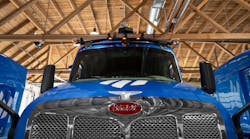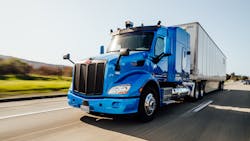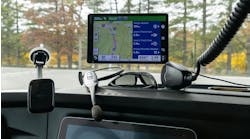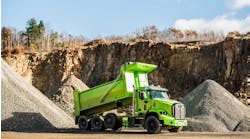Embark moves into Houston with plans to grow autonomous trucking hub with Texas A&M
Self-driving technology company Embark Trucks is expanding into Texas, launching a new autonomous trucking lane between Houston and San Antonio. Embark also announced it will open an autonomous trucking facility with plans to “hire aggressively” in the greater Houston area next year.
Less than a month after the company went public (listing on Nasdaq under EMBK), it announced these new plans to begin hauling freight for its partners between San Antonio and Houston as early as 2022. Embark is working toward a goal to offer its Embark Driver technology commercially to fleets by 2024.
The San Fransisco-based startup also is partnering with the Texas A&M Engineering Experiment Station (TEES) to use its test track and work with its Center for Autonomous Vehicles and Sensor Systems (CANVASS) and faculty in the J. Mike Walker '66 Department of Mechanical Engineering. Embark will partner with Texas A&M to research and test autonomous trucking and technology as it prepares for its self-driving pilot runs in 2023.
See also: Self-driving technology won’t endanger truck driver's role, developers say
“Texas is the center of America's trucking industry, and it’s the perfect home for Embark’s expanded operations. We’re excited by the talent and entrepreneurial spirit that Houston has to offer,” said Stephen Houghton, chief operations and fleet officer at Embark. “Our new footprint in Texas will support our growing network of partners and fuel our rapid growth across the Sunbelt. As we scale our operations, we will continue to work closely with local and state governments and other organizations so that we improve the safety, sustainability, and efficiency of trucking with autonomous technology.”
Houston as a trucking and autonomous freight hub
In a Dec. 9 announcement, Embark noted that the Houston area is ideal for its business strategy. Houston is a trucking hub positioned for commercially viable long-haul autonomous freight. The city is at the center of more than 600 miles of trucking lanes. These lanes would be ideal for automation as they are too long for a single driver to complete in one day due to hours-of-service limitations.
A 600-mile run could take about 22 hours to complete manually, assuming full compliance with the federal hours-of-service rules, while that same run could take just 12 hours to complete autonomously.
See also: Autonomous truck testing heats up under the Texas sun
The Houston area also is home to academic and research institutions dedicated to autonomous vehicle technology, such as those at Texas A&M. In its announcement, Embark said it expects to work closely with these partners to test, deploy, and validate its technology. With other autonomous trucking companies operating in the Houston area, Embark expects to find a deep talent pool to expand its workforce in the region.
Texas also boasts a thriving autonomous vehicle sector with its extensive public-private partnerships. By engaging with developers to support the safe operation of autonomous trucks, the Texas Departments of Transportation (TxDOT) and Public Safety (TxDPS) established Texas as a state well-positioned to reap potential safety and efficiency benefits of autonomous freight technology. Embark said it would continue to cultivate relationships with state and local agencies as it prioritizes highway road safety and responsible integration of autonomous trucks into the state transportation system.
Autonomous research at Texas A&M
Embark’s partnership with Texas A&M is one of the cornerstones of this expansion. Embark will use the university’s expertise and the test track at the Rellis Campus to pioneer novel AV capabilities and achieve its remaining technology milestones. These milestones, according to Embark, represent “the final hurdles” to deploying commercially viable autonomous trucks, and include challenges such as emergency vehicle interactions, pulling over to safety in emergencies, and performing evasive maneuvers, among others.
“Embark’s mission to safely, robustly, and effectively roll out commercial autonomous trucks aligns closely with TEES’ mission to turn research and development activities into useful applications and business activities,” said Dr. Srikanth Saripalli, director of CANVASS. “We’re excited to welcome Embark to our RELLIS Campus. Our faculty and students will have the unique opportunity to apply theory to the real world by working together with Embark on engineering projects.”
Embark’s expansion into Texas builds on several years of engagement with Texas state officials to share information on the development of autonomous trucks. Embark is a long-standing participant in the TxDOT’s Connected and Automated Vehicle Task Force, helping prepare the the state's transportation system to utilize this emerging technology.




